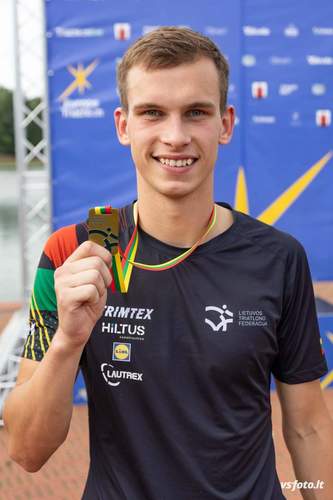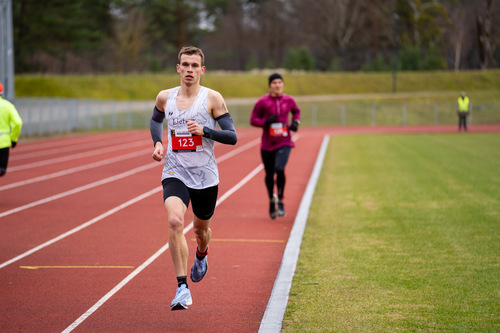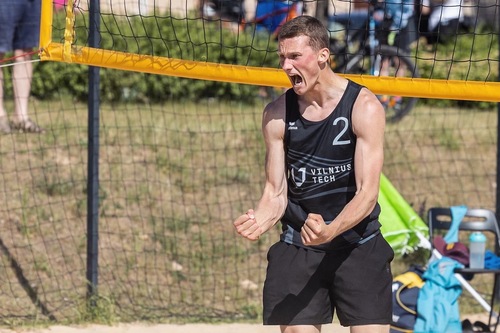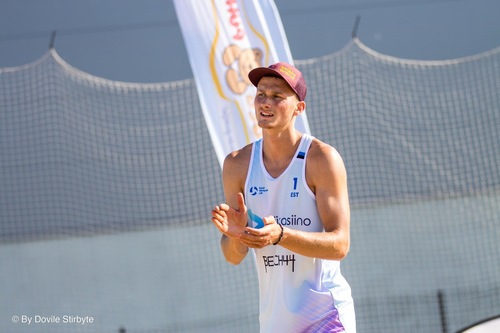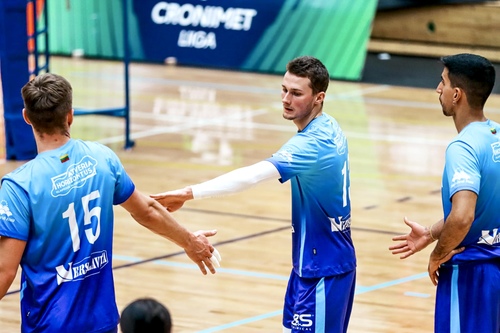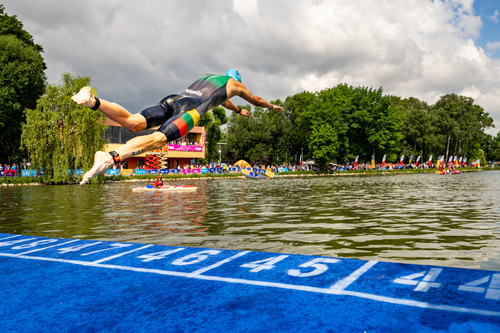- Programmes in English 2025/2026
- Admission 2025/2026 Scholarships
- For exchange students
- Free Movers
- Transfer studies
- Erasmus+ studies and traineeships
- Mentor programme
- Student testimonials
- Accommodation
- Career Services
- Medical Care
- Immigration Regulations
- Leisure and Student Activities
- Useful information
- VILNIUS TECH for Creators of Tomorrow
- Mental and spiritual support
- Representatives Abroad
- Contacts
- Computer Engineering
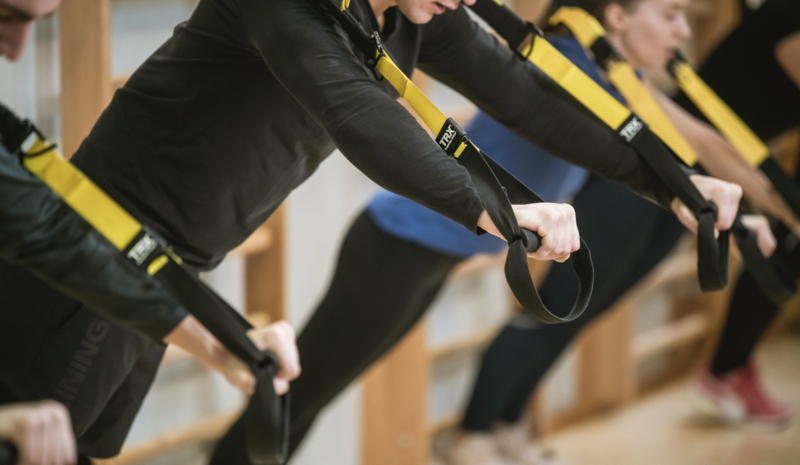.png)
2024-02-26
Victory in sports: being physically prepared is not enough
Emilis Bartkus and Lukas Prokopavičius - two future creators of Vilnius Gediminas Technical University (VILNIUS TECH), for their merits and achievements in sports in 2023 were awarded as the best student athletes by the Lithuanian Student Sports Association (LSSA).
Both young men are studying different subjects, compete in different sports as well, but what they have in common is determination, endurance, and a desire to give it all. Let's get to know them.
– Let's introduce ourselves – what are you studying at VILNIUS TECH and what year are you in?
Emilis: I am studying in the Faculty of Environmental Engineering, in the Geodesy and Geoinformatics study program, I am in my third year.
Lukas: I’m studying Software Engineering at the Faculty of Fundamental Sciences, I am in my fourth year.
– What led you to sports and why?
Emilis: I think my brother Edgaras guided me to sports. I followed in his footsteps all my childhood and adolescence, did the same sports as he did until and we both eventually chose volleyball (current coach at VILNIUS TECH – Radoslav Adamovič).
Lukas: Sports have always been with me throughout my life. From a very young age, I spent summer days riding a bike, was a part of various sports clubs, but eventually ended up in triathlon (current coach at VILNIUS TECH – Dalius Pavliukovičius). When I started it was just for fun, but over time it grew into more than just entertainment for me.
– What attracts you to this particular sport? What do you find in it?
Emilis: It's hard to answer this question briefly, but I'll try to list the main aspects. Both beach and indoor volleyball captivate me with the complexity of technique, tactical aspects, and positional differences. I like that this sport requires very good physical preparation. A person playing volleyball must be a true athlete and work hard in order to achieve good results on the court. I enjoy every moment during competitions or training sessions, I try to analyse myself, learn more and more each time. The team, with which I spend most of my time, contributes to this whole combination. Throughout the season, various things happen that remain in memory and I always remember them with a smile on my face.
Both young men are studying different subjects, compete in different sports as well, but what they have in common is determination, endurance, and a desire to give it all. Let's get to know them.
– Let's introduce ourselves – what are you studying at VILNIUS TECH and what year are you in?
Emilis: I am studying in the Faculty of Environmental Engineering, in the Geodesy and Geoinformatics study program, I am in my third year.
Lukas: I’m studying Software Engineering at the Faculty of Fundamental Sciences, I am in my fourth year.
– What led you to sports and why?
Emilis: I think my brother Edgaras guided me to sports. I followed in his footsteps all my childhood and adolescence, did the same sports as he did until and we both eventually chose volleyball (current coach at VILNIUS TECH – Radoslav Adamovič).
Lukas: Sports have always been with me throughout my life. From a very young age, I spent summer days riding a bike, was a part of various sports clubs, but eventually ended up in triathlon (current coach at VILNIUS TECH – Dalius Pavliukovičius). When I started it was just for fun, but over time it grew into more than just entertainment for me.
– What attracts you to this particular sport? What do you find in it?
Emilis: It's hard to answer this question briefly, but I'll try to list the main aspects. Both beach and indoor volleyball captivate me with the complexity of technique, tactical aspects, and positional differences. I like that this sport requires very good physical preparation. A person playing volleyball must be a true athlete and work hard in order to achieve good results on the court. I enjoy every moment during competitions or training sessions, I try to analyse myself, learn more and more each time. The team, with which I spend most of my time, contributes to this whole combination. Throughout the season, various things happen that remain in memory and I always remember them with a smile on my face.
Lukas: Triathlon – a combination of three sports, which are quite different but they all require endurance. I particularly like the dynamics of training because you train for more than one sport.
– Sports require various qualities: quick thinking, endurance, fast reaction. Which ones are most important in your sport? Is good physical preparation alone enough?
Emilis: All the qualities you mentioned are very important. In addition, I would also include mastering volleyball technique, physical preparation, and certain character traits.
Lukas: Endurance, because competitions can last about 30 minutes or 2 hours, not to mention longer distances. However, like in any sport, good physical preparation alone will not make you a winner. When trying to achieve high results, pushing yourself to the maximum, psychology becomes a part of the process – if you don't want to suffer or achieve a good result – it won't be achieved.
– What is the most difficult or challenging aspect in your sport?
Emilis: I think the most difficult thing in volleyball is to keep cool nerves and a clear mind. There are many moments when nerves, uncontrolled emotions get in the way – that is when mistakes happen. Probably, every athlete works on staying calm during all competitions so that emotions do not interfere with achieving higher results. To overcome these challenges, you need to analyse yourself. If a bad result occurred due to emotions or lack of control over nerves, you should remember what the situation was like and think about what you could do differently next time to avoid such outcome.
Lukas: I think the most difficult thing is to balance the whole routine of life so that there is enough time not only for training but also for studies, work, or other activities.
– What generally motivates you to compete? Is the desire to win provides sufficient motivation? Emilis: I have no problem with motivation; the moment I hear a whistle signalling the start of the match, I want to dominate and win.
Lukas: As far as I can remember, I always stand at the starting line with one goal – to do my best. If the desire to win is your motivation and it accompanies you in all training sessions, then, I think, it is a sufficient motivation. However, I am not motivated solely by victory; I like to compete, to squeeze out the maximum from myself and feel that taste of blood in my mouth.
– It is said that victory teaches nothing, but defeat – a lot. Do you agree with this saying? Perhaps you have your sports examples when victory or defeat taught you something?
Emilis: I agree with this saying. I won't give specific examples, but the most common case in sports is an underestimated opponent. Then you come to the competition as a winner, not evaluating the opponent, which leads to the experience of defeat. Such defeats are the most painful; they teach you and make you think. The most memorable for me was the final of last year's Lithuanian men's volleyball championship in Alytus. Although it was not my first final in the Lithuanian championship, but in this final, I had an important role on the court, so this final stuck in my memory the most. I remember these matches as both the most painful defeat because we were very close to victory and the first place, but it also was a victory nonetheless because I gained a lot of experience and enjoyed the game.
Lukas: Every defeat is a lesson from which we learn because every defeat is painful, so I usually remember them better than victories because I know what not to do to win.
– Do you have any special traditions or rituals before competitions?
Emilis: I don't have any special rituals, but before every competition, I try to listen to my favourite music and have a cup of coffee.
Lukas: I have no rituals; I try to be independent of the environment or things, the important thing is to have sports equipment with me, and then I will do the rest.
– What are your future plans regarding sports? Do you plan to continue actively participating in competitions after graduating?
Emilis: Right now, the priority is to finish my studies, and after that, I'll see, maybe I'll dive even deeper into sports and volleyball.
Lukas: After the 2023 season, I quit swimming, so there is little chance to see me in triathlon competitions next season, but now I spend more time running, and when the weather gets warmer, I'll start cycling and prepare for the European as well as World Duathlon Championships. I believe that sports will accompany me for a long time as the pursuit of results motivates me, and I 100 percent enjoy what I am doing now.
– Sports require various qualities: quick thinking, endurance, fast reaction. Which ones are most important in your sport? Is good physical preparation alone enough?
Emilis: All the qualities you mentioned are very important. In addition, I would also include mastering volleyball technique, physical preparation, and certain character traits.
Lukas: Endurance, because competitions can last about 30 minutes or 2 hours, not to mention longer distances. However, like in any sport, good physical preparation alone will not make you a winner. When trying to achieve high results, pushing yourself to the maximum, psychology becomes a part of the process – if you don't want to suffer or achieve a good result – it won't be achieved.
– What is the most difficult or challenging aspect in your sport?
Emilis: I think the most difficult thing in volleyball is to keep cool nerves and a clear mind. There are many moments when nerves, uncontrolled emotions get in the way – that is when mistakes happen. Probably, every athlete works on staying calm during all competitions so that emotions do not interfere with achieving higher results. To overcome these challenges, you need to analyse yourself. If a bad result occurred due to emotions or lack of control over nerves, you should remember what the situation was like and think about what you could do differently next time to avoid such outcome.
Lukas: I think the most difficult thing is to balance the whole routine of life so that there is enough time not only for training but also for studies, work, or other activities.
– What generally motivates you to compete? Is the desire to win provides sufficient motivation? Emilis: I have no problem with motivation; the moment I hear a whistle signalling the start of the match, I want to dominate and win.
Lukas: As far as I can remember, I always stand at the starting line with one goal – to do my best. If the desire to win is your motivation and it accompanies you in all training sessions, then, I think, it is a sufficient motivation. However, I am not motivated solely by victory; I like to compete, to squeeze out the maximum from myself and feel that taste of blood in my mouth.
– It is said that victory teaches nothing, but defeat – a lot. Do you agree with this saying? Perhaps you have your sports examples when victory or defeat taught you something?
Emilis: I agree with this saying. I won't give specific examples, but the most common case in sports is an underestimated opponent. Then you come to the competition as a winner, not evaluating the opponent, which leads to the experience of defeat. Such defeats are the most painful; they teach you and make you think. The most memorable for me was the final of last year's Lithuanian men's volleyball championship in Alytus. Although it was not my first final in the Lithuanian championship, but in this final, I had an important role on the court, so this final stuck in my memory the most. I remember these matches as both the most painful defeat because we were very close to victory and the first place, but it also was a victory nonetheless because I gained a lot of experience and enjoyed the game.
Lukas: Every defeat is a lesson from which we learn because every defeat is painful, so I usually remember them better than victories because I know what not to do to win.
– Do you have any special traditions or rituals before competitions?
Emilis: I don't have any special rituals, but before every competition, I try to listen to my favourite music and have a cup of coffee.
Lukas: I have no rituals; I try to be independent of the environment or things, the important thing is to have sports equipment with me, and then I will do the rest.
– What are your future plans regarding sports? Do you plan to continue actively participating in competitions after graduating?
Emilis: Right now, the priority is to finish my studies, and after that, I'll see, maybe I'll dive even deeper into sports and volleyball.
Lukas: After the 2023 season, I quit swimming, so there is little chance to see me in triathlon competitions next season, but now I spend more time running, and when the weather gets warmer, I'll start cycling and prepare for the European as well as World Duathlon Championships. I believe that sports will accompany me for a long time as the pursuit of results motivates me, and I 100 percent enjoy what I am doing now.
The text was prepared by Milda Mockūnaitė-Vitkienė, the Head of Internal Communication Projects at the Public Communication Directorate of VILNIUS TECH.














